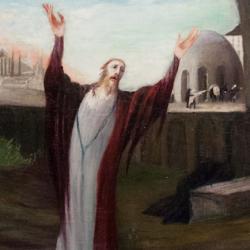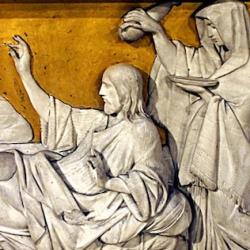Matthew 10: I send you out as sheep in the midst of wolves.
As we saw in the sermon this morning, Jesus distinguishes His disciples from the leaders of Israel as sheep from wolves. The Jewish leaders prey on the people, but the Twelve are supposed to take their place among the sheep, allowing themselves to be devoured rather than devouring. They are supposed to follow the example of Jesus, the Good Shepherd who does not flee when the wolves come but gives Himself for His sheep.
Sheep and wolves differ in many respects, but in this passage they differ above all in diet. Wolves are predators or scavengers, and carnivores. Sheep are herbivores. Wolves eat sheep; sheep don’t eat wolves.
In Matthew 10, this dietary distinction has a political dimension. The predators are the oppressive rulers, the sheep are the oppressed sheep. And that political dimension is deeply relevant to the meaning of the Lord’s table.
Jesus does not dine with devils. He does not gather a pack of wolves. He sometimes ate with Pharisees, but more commonly we see Him at table with tax collectors and sinners, with prostitutes and outcasts. He was the shepherd, but He ate alongside with His sheep, especially the most unbecoming of them. He did not join the oppressors, but the oppressed.
That is the calling of this table as well. This is not a table for wolves. This is a table for sheep, for those who are willing to go among lost sheep as sheep in the midst of wolves, to give their lives for the sheep. After eating at this table, we dare not join the predators. After we have eaten at this table, it would be a contradiction for us to join with tyrants and thugs.
Paul says that we cannot eat at the table of the Lord and the table of demons. We can equally say that we cannot eat at the table of the Shepherd and also at the table of wolves.











